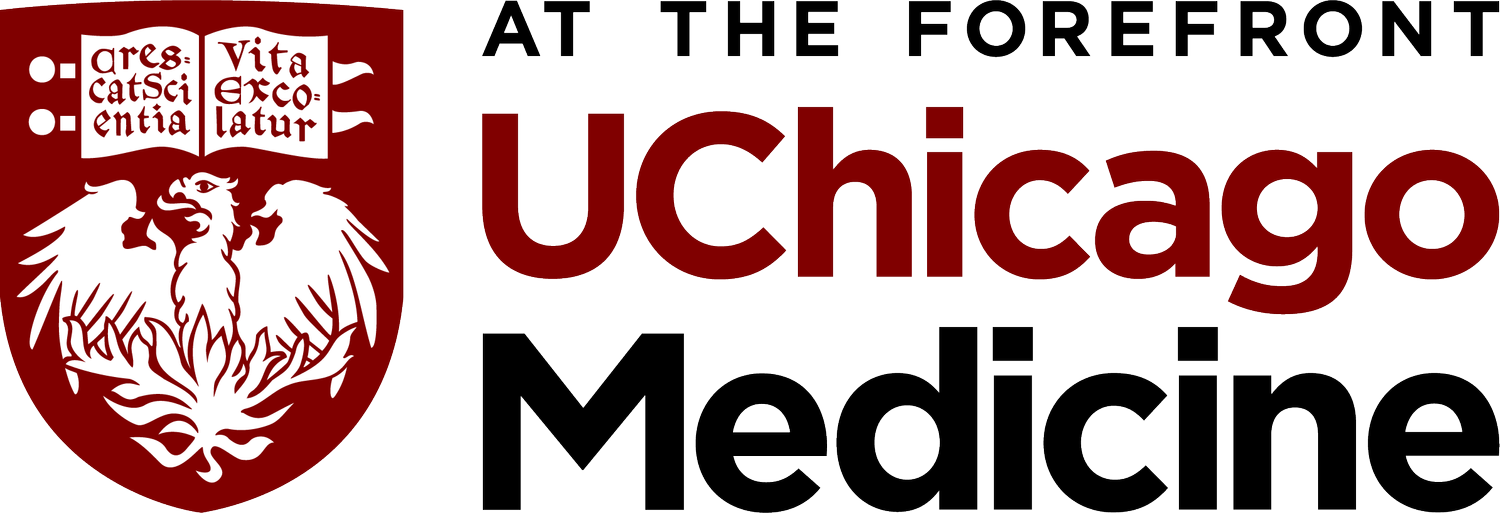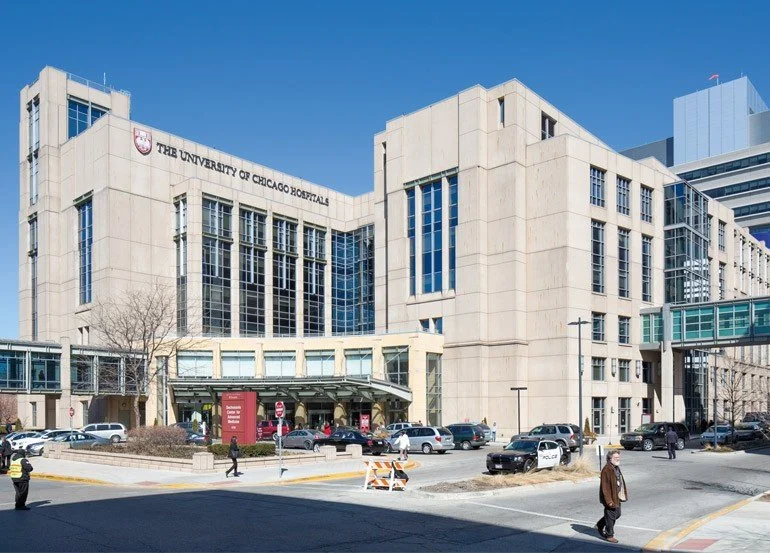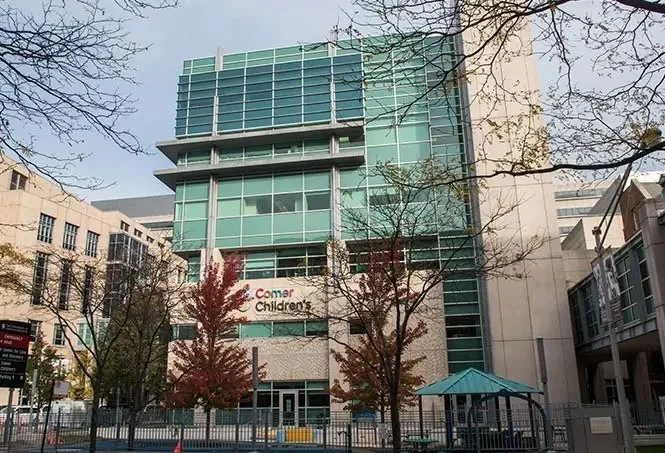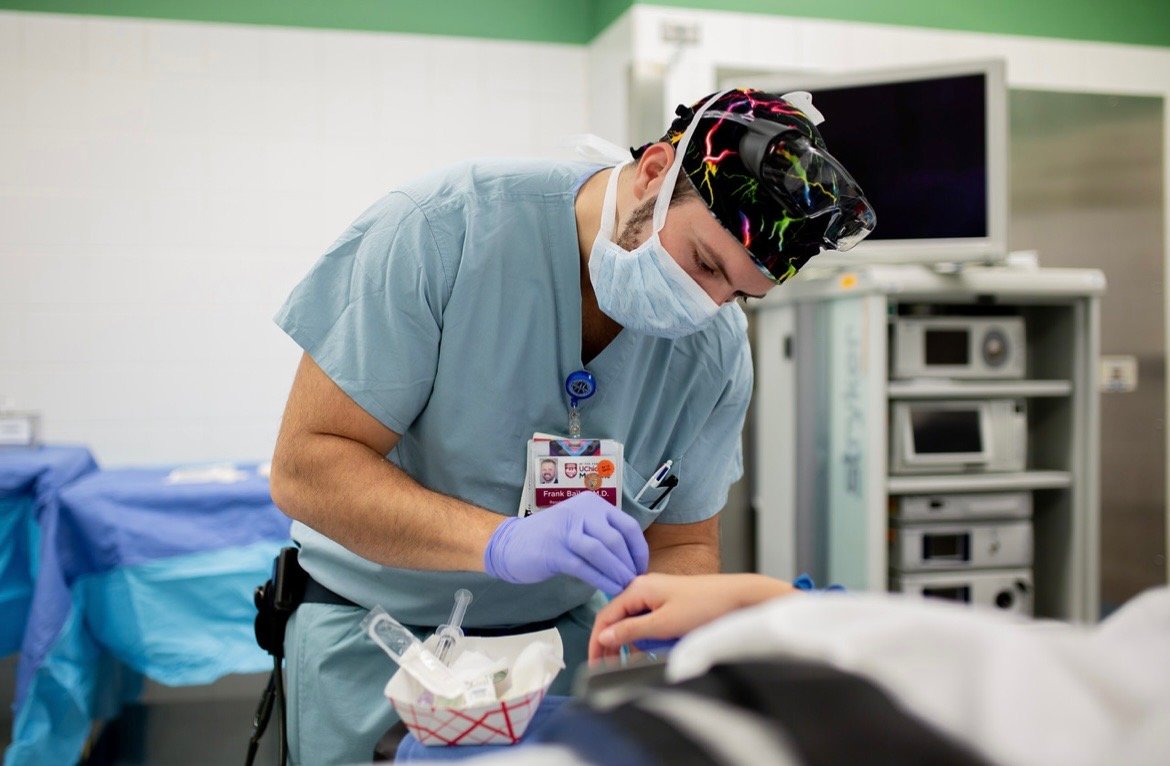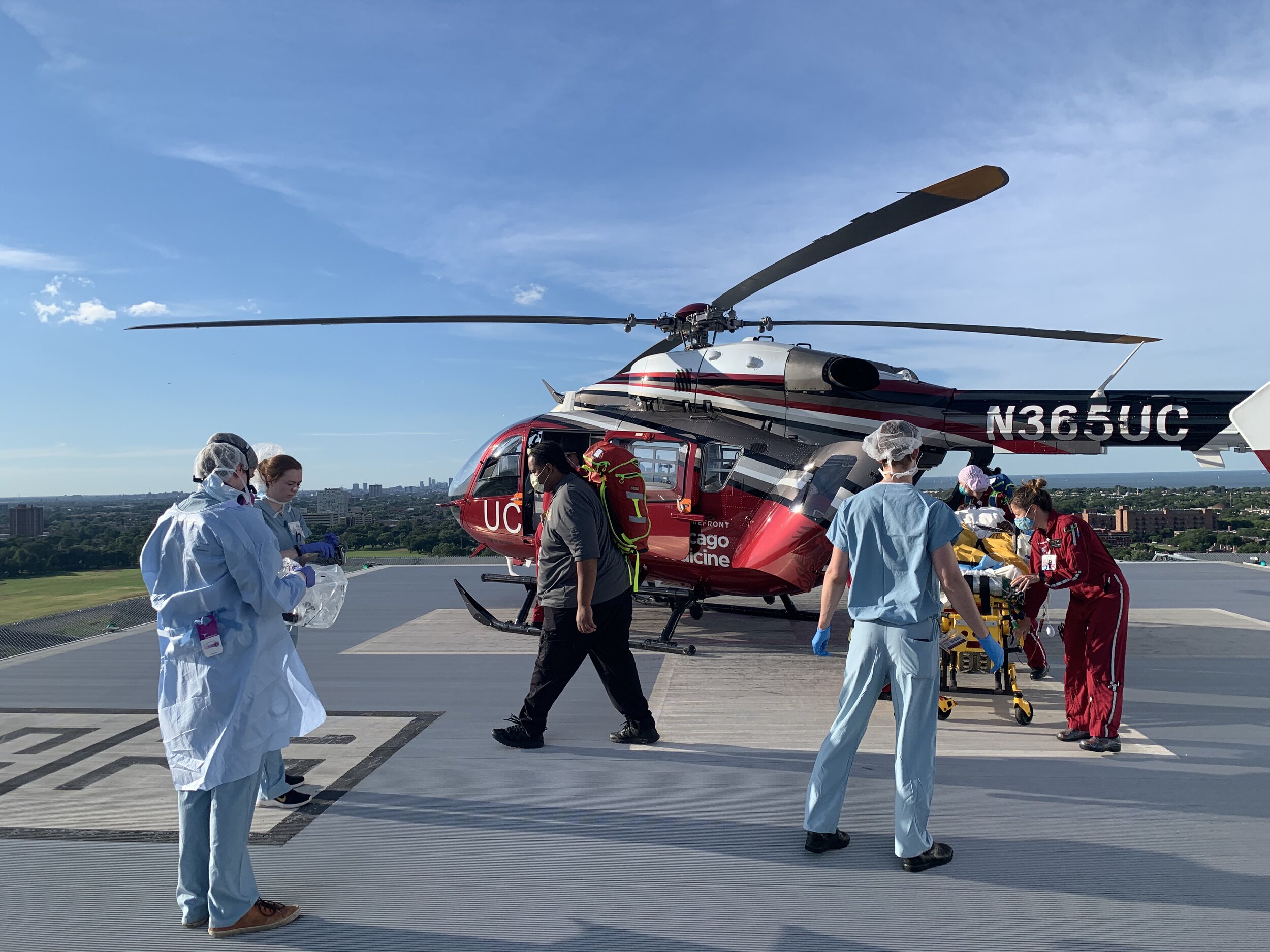
Our Facilities
The University of Chicago Medical Center is adjacent to the main campus of the University of Chicago, sharing the beauty of the historic campus along with the Washington Park and the Hyde Park neighborhoods. In addition to cutting-edge technology, and state-of-the-art equipment, the storied and close-knit relationship with the University makes residents’ lives richer. Collaboration in our outpatient clinics, ambulatory surgery center, pediatric hospital, and world-renowned research laboratories means more opportunities for hands-on experience and growth. Being on the South Side of Chicago, we are able to care for one of the most underserved communities in the country and immediately impact our neighbors’ lives.
Clinical Sites
Intern Year
The intern year at UChicago is meant to prepare you for the breadth of pathology and pathophysiology you will see in the ORs. Our 13 categorical interns spend their entire intern year at UChicago; 4 of our advanced residents can do their intership at Endeavor Health Medical Group in Evanston, IL in a dedicated track. Both locations include general medicine and MICU rotations with a selection of subspecialties. The NorthShore Hospital System provides an educational cardiology rotation, which includes interventional cardiology procedures. Those that rotate through the UChicago Hyde Park Campus benefit from a month rotating with our ENT colleagues, a month in the Cardiothoracic ICU (staffed entirely by UChicago attending anesthesiologists), 2 weeks in Pain Medicine clinic performing interventional pain procedures, and 2 weeks in Anesthesia Perioperative Medicine Clinic . Both locations equip residents with the knowledge and experience to excel through the rest of residency.
CA-1 YEAR: Basics to Subspecialties
The first month of the CA-1 year is intense as residents are paired one-on-one with an attending. Over the years, residents agree that the tutorial experience at UChicago is special in building relationships with not only their attendings, but fellow classmates. CA-1 residents are excused from the OR with their class for lunch and afternoon lecutres to focus on learning the basics of anesthesia. CA-1s spend most of the year rotating through general anesthesia split into various subspecialties such as urology, orthopedic surgery, otolaryngology and PACU. CA-1s also rotate through CTICU, SICU, obstetrics and gynecology and towards the end of the year, even cardiac surgery and pediatrics. It is NOT uncommon for residents to rotate through cardiac, OB, and pediatrics by the end of their CA1 year.
CA-2 YEAR: subspecialty mastery &
emerging leadership
The emphasis of the CA-2 year is to build on the CA-1 foundation and continue advancing to the management of more complex patients, requiring a more detailed anesthetic plan. Residents rotate through cardiac, pediatrics, neurosurgery, vascular/thoracic, and surgical critical care, caring for some of the sickest patients in the state. CA-2 residents acquire proficiency and gain increasing autonomy in managing patients of high medical complexity.
CA-3 YEAR: team leader
Residents tailor their rotation schedule to gain specific experiences that suit their interests and career goals. The focus of this year is transitioning towards independent practice. Residents will learn valuable administrative triaging skills while running the call team, coordinating board assignments, attending trauma activations, codes, emergency airways, and performing the most complex anesthetics in the hospital. With their elective time, senior residents can choose anything from research to Advanced Clinical Tracts where they select their own cases. Increased autonomy as part of the night call team prepares residents for their next steps as attendings.
rotations
-
In addition to caring for the most underserved patients in the city, the University of Chicago is sought out internationally by patients who need cardiac surgery. We care for everything from minimally invasive and open valve surgeries to complex aortic repairs and heart transplants. Despite the complexity of our patients, we boast the highest survivability of heart transplants in the country. We also perform some of the most advanced robotic cardiac surgeries in the world, including Totally Endoscopic Coronary Artery Bypass surgery. We are home to world-renowned cardiac anesthesiologists, whose mentorship draws many of our residents to pursue cardiac anesthesia fellowship. We see > 500 pump cases, > 100 VADs, > 60 heart and lung transplants and provide intra-op care for many patients on VA/VV ECMO. Many of our graduates have joined private practice groups where they care for cardiac surgical patients without having any fellowship training, all of whom have felt adequately prepared with their experience at UChicago.
-
The residents at the University of Chicago benefit from access to Comer Children’s Hospital, the only free-standing pediatric Level 1 trauma center on the South Side of Chicago. Comer houses 213 inpatients where our residents attend pediatric traumas, staff emergent cases in the operating room, and provide regional and neuraxial blocks to our pediatric patients. The PICU and Level III NICU care for some of the most complex children’s cases in the state, allowing our residents to handle anything from bread-and-butter pediatrics to the most complex anesthetics.
-
Residents spend quite some time in the general OR pool where they are exposed to a large variety of cases on a day to day basis. In CA-1 year, GOR provides an opportunity for residents to learn and become comfortable with basic anesthesia skills. In CA-2 and CA-3 years, GOR allows residents to further hone their anesthetic skills and helps transition them into becoming leaders and supervisors. The University of Chicago became a level 1 trauma center in 2018. Since then, it has seen over > 18,000 adult traumas and > 2,500 pediatric traumas. Residents have an ample amount of trauma anesthesia experience and become experts in advanced airway management, MTPs, emergency line placements, management of polytrauma, ATLS, and utilization of intra-op POCUS and TEE.
-
One of UChicago’s greatest strengths as a training program is its early and diverse exposure to critical care. During intern year, residents rotate through the MICU and Cardiothoracic ICU (CTICU) at UChicago Hyde Park. In the following years, residents continue to rotate through the CTICU at UChicago, a 25-bed ICU that cares for the highest-acuity post-op cardiac patients, managing complex mechanical circulatory support (VADs, ECMO) as well as complex vascular and thoracic patients. As the primary ICU of the Department of Anesthesia and Critical Care, the emphasis is building hands-on skills including line placement, ultrasound, and ECHO. Second-year residents have the opportunity to rotate through the Surgical Intensive Care Unit that primarily cares for our trauma patients. This provides a collaborative learning environment between the trauma, anesthesia, and surgical critical care team.
-
Several years ago we largely expanded our regional anesthesia program with the help of our talented regional-trained faculty. There is a regional team in our main OR's in CCD as well as our outpatient ambulatory OR's in DCAM. Residents have a chance to rotate 1-2 months on a regional elective and gain clinical skills to independently perform regional and neuraxial anesthesia techniques. Residents perform a wide variety of blocks including, but not limited to brachial plexus, TAP, femoral nerve, adductor, sciatic, fascia iliaca, PECS, erector spinae blocks, as well as lumbar and thoracic epidurals.
-
The Anesthesia Perioperative Medicine Clinic (APMC) sees between 6,000-8,000 patients a year. Residents learn how to enhance the comfort and safety of patients coming for surgery, how to coordinate care with the patient's perioperative team, how to optimize the use of medical resources in providing care through avoiding unnecessary preoperative testing, and how to minimize preventable day of surgery cancellations or delays. During the three clinical anesthesia years at the University of Chicago, a minimum of one month is spent in the Anesthesia Perioperative Medicine Clinic (APMC). This rotation is divided into 2-week segments in the CA-2 and CA-3 years. Our interns now also spend two weeks in the Anesthesia Perioperative Medicine Clinic, where they gain hands-on experience in preoperative evaluation and learn directly from faculty about optimizing patients for surgery.
-
UChicago delivers, on average, over 3,000 parturients per year and is well-known for caring for the most high-risk parturients in Chicago. With the recent closure of Mercy Hospital, a safety-net hospital on the South Side of Chicago, our volume of high-risk parturients has increased as access to pre-natal and obstetric care has become increasingly limited in the South Side of our city. As a result, our residents benefit from placing hundreds of epidurals in medically complex mothers and managing their labor and operative courses. Our residents routinely rank this as one of their favorite rotations due to the camaraderie with their OB colleagues, the excellent didactics, and the confidence they acquire with their neuraxial skills.
-
Our unique pain rotation combines two weeks of Acute Pain Service (APS) and two weeks in the outpatient Chronic Pain Clinic. The APS service focuses on assessing patients in the hospital to treat pain in a multi-modal approach using regional and neuraxial techniques. The Chronic Pain outpatient rotation is routinely praised as one of the nation’s best due to the highly interventional nature of the rotation with residents participating in the over 4,800 procedures and OR cases performed by our pain specialists each year. Attendings on this rotation are experts in pain management, serving as research mentors to many of our residents.
-
The general OR (GOR) is further split into various subspecialties throughuot the 3 clinical anesthesia years. By spending a month in each of these rotations, residents become comfortable and confident in providing anesthetic care in all areas of anesthesia. Subspecialties include neurosurgery, vascular surgery, thoracic surgery, orthopedic surgery, ENT surgery, and urological surgery.
Residents also spend a month in CA-1 year on a combined PACU and airway rotation. The PACU resident has primary responsibility for all the patients brought from the operating rooms to the PACU until they are either discharged from the unit or their care is transferred over to another service for overnight ICU care in the PACU. Residents develop the ability to recognize and treat a wide variety of clinical situations that arise in the post-operative care unit. This resident is also in charge of responding to cardiac arrest and anesthesiology overheads throughout the medical center, giving them experience in managing emergent and complex airways.
